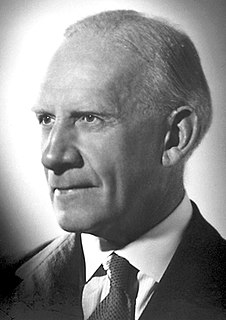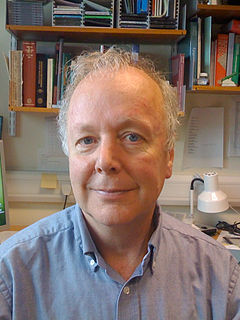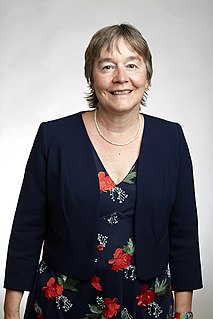Related Research Articles

Sir Frederick Gowland Hopkins was an English biochemist who was awarded the Nobel Prize in Physiology or Medicine in 1929, with Christiaan Eijkman, for the discovery of vitamins, even though Casimir Funk, a Polish biochemist, is widely credited with discovering vitamins. He also discovered the amino acid tryptophan, in 1901. He was President of the Royal Society from 1930 to 1935.

Richard Laurence Millington Synge FRS FRSE FRIC FRSC MRIA was a British biochemist, and shared the 1952 Nobel Prize in Chemistry for the invention of partition chromatography with Archer Martin.

Frederick Sydney Dainton, Baron Dainton, Kt, FRS, FRSE was a British academic chemist and university administrator.

Sir Robert Robinson was a British organic chemist and Nobel laureate recognised in 1947 for his research on plant dyestuffs (anthocyanins) and alkaloids. In 1947, he also received the Medal of Freedom with Silver Palm.
Prof Arthur Geoffrey Walker FRS FRSE was a British mathematician who made important contributions to physics and physical cosmology. Although he was an accomplished geometer, he is best remembered today for two important contributions to general relativity.

Sir James Fraser Stoddart is a British-American chemist who is Board of Trustees Professor of Chemistry and head of the Stoddart Mechanostereochemistry Group in the Department of Chemistry at Northwestern University in the United States. He works in the area of supramolecular chemistry and nanotechnology. Stoddart has developed highly efficient syntheses of mechanically-interlocked molecular architectures such as molecular Borromean rings, catenanes and rotaxanes utilising molecular recognition and molecular self-assembly processes. He has demonstrated that these topologies can be employed as molecular switches. His group has even applied these structures in the fabrication of nanoelectronic devices and nanoelectromechanical systems (NEMS). His efforts have been recognized by numerous awards including the 2007 King Faisal International Prize in Science. He shared the Nobel Prize in Chemistry together with Ben Feringa and Jean-Pierre Sauvage in 2016 for the design and synthesis of molecular machines.

Alexander Crum Brown FRSE FRS was a Scottish organic chemist. Alexander Crum Brown Road in Edinburgh's King's Buildings complex is named after him.
Thomas Logie MacDonald FRSE FRAS (1901–1973) was a Scottish astronomer and politician, and eponym of lunar crater McDonald.

Sir Thomas Leon Blundell, is a British biochemist, structural biologist, and science administrator. He was a member of the team of Dorothy Hodgkin that solved in 1969 the first structure of a protein hormone, insulin. Blundell has made contributions to the structural biology of polypeptide hormones, growth factors, receptor activation, signal transduction, and DNA double-strand break repair, subjects important in cancer, tuberculosis, and familial diseases. He has developed software for protein modelling and understanding the effects of mutations on protein function, leading to new approaches to structure-guided and Fragment-based lead discovery. In 1999 he co-founded the oncology company Astex Therapeutics, which has moved ten drugs into clinical trials. Blundell has played central roles in restructuring British research councils and, as President of the UK Science Council, in developing professionalism in the practice of science.

Thomas Charles Hope was a British physician, chemist and lecturer. He proved the existence of the element strontium, and gave his name to Hope's Experiment, which shows that water reaches its maximum density at 4 °C (39 °F).
Veronica van Heyningen is an English geneticist who specialises in the etiology of anophthalmia as an honorary professor at University College London (UCL). She previously served as head of medical genetics at the MRC Human Genetics Unit in Edinburgh and the president of The Genetics Society. In 2014 she became president of the Galton Institute. As of 2019 she chairs the diversity committee of the Royal Society, previously chaired by Uta Frith.

Sir Adrian Peter Bird, is a British geneticist and Buchanan Professor of Genetics at the University of Edinburgh. Bird has spent much of his academic career in Edinburgh, from receiving his PhD in 1970 to working at the MRC Mammalian Genome Unit and later serving as director of the Wellcome Trust Centre for Cell Biology. His research focuses on understanding DNA methylation and CpG islands, and their role in diseases such as Rett syndrome.
Alan Ashworth, FRS is a British molecular biologist, noted for his work on genes involved in cancer susceptibility. He is currently the President of the UCSF Helen Diller Family Comprehensive Cancer Center at the University of California, San Francisco, a multidisciplinary research and clinical care organisation that is one of the largest cancer centres in the Western United States. He was previously CEO of the Institute of Cancer Research (ICR) in London.

(George) Guy Dodson FRS FMedSci, was a biochemist who specialised in protein crystallography at the University of York.

Dame Lesley Anne Glover is a Scottish biologist and academic. She was Professor of molecular biology and cell biology at the University of Aberdeen before being named Vice Principal for External Affairs and Dean for Europe. She served as Chief Scientific Adviser to the President of the European Commission from 2012 to 2014. In 2018 she joined the Principal's senior advisory team at the University of Strathclyde.

Lesley Jane Yellowlees, is a British inorganic chemist conducting research in Spectroelectrochemistry, Electron transfer reactions and Electron paramagnetic resonance (EPR) Spectroscopy. Yellowlees was also elected as the president of the Royal Society of Chemistry 2012–14 and was the first woman to hold that role.

Gabriele Clarissa Hegerl is Professor of Climate System Science at the University of Edinburgh School of GeoSciences. Prior to 2007 she held research positions at Texas A&M University and at Duke University's Nicholas School of the Environment, during which time she was a co-ordinating lead author for the Intergovernmental Panel on Climate Change (IPCC) Fourth and Fifth Assessment Report.

Andrew Peter Mackenzie is a director of Physics of Quantum Materials at the Max Planck Institute for Chemical Physics of Solids in Dresden, Germany and Professor of Condensed Matter Physics at the University of St Andrews, Scotland. He became a co-editor of the Annual Review of Condensed Matter Physics as of 2020.
William Charles Earnshaw is Professor of Chromosome Dynamics at the University of Edinburgh where he has been a Wellcome Trust Principal Research Fellow since 1996.

Neil Andrew Robert Gow is a professor of Microbiology and deputy Vice Chancellor at the University of Exeter. Previously he served at the University of Aberdeen for 38 years and retains an honorary Chair there.
References
- ↑ "Archived copy" (PDF). Archived from the original (PDF) on 27 June 2018. Retrieved 27 June 2018.
{{cite web}}: CS1 maint: archived copy as title (link) - ↑ Biographical Index of Former Fellows of the Royal Society of Edinburgh 1783–2002 (PDF). The Royal Society of Edinburgh. July 2006. ISBN 0-902-198-84-X. Archived from the original (PDF) on 4 March 2016. Retrieved 27 June 2018.